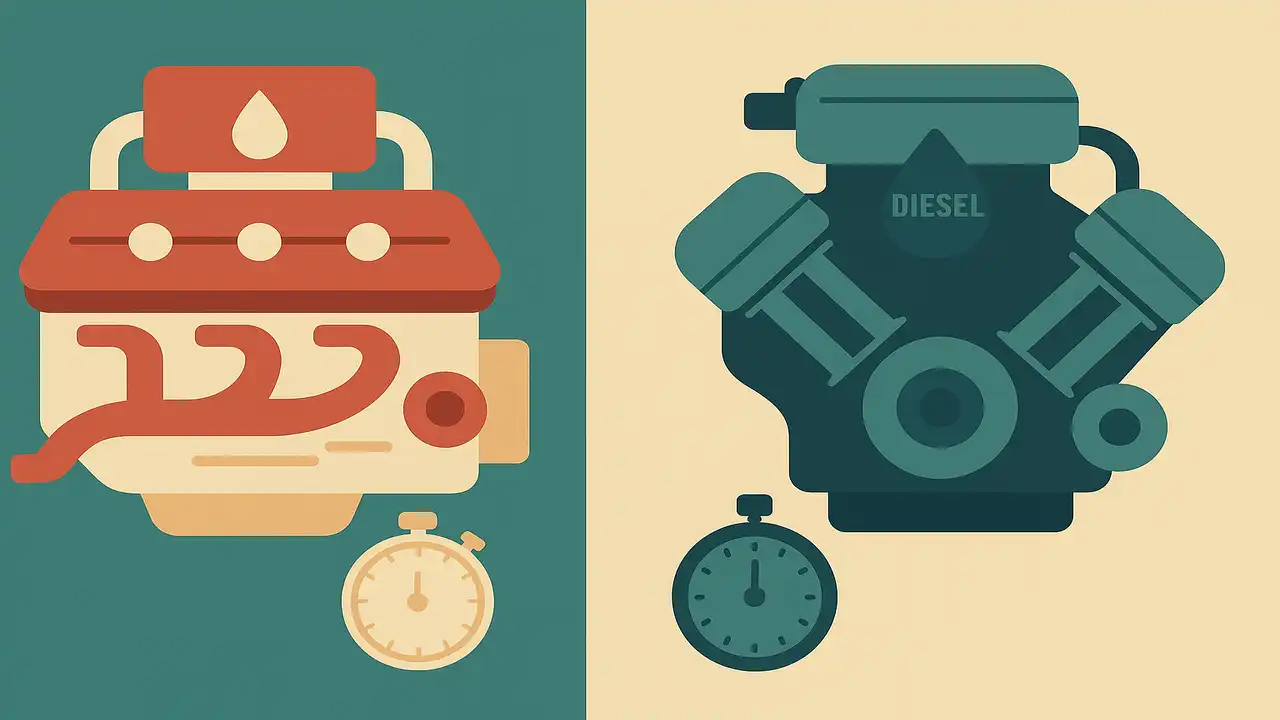If you’ve ever stood at a showroom thinking whether to go for the petrol or diesel version of a car, you’ve likely asked yourself one direct question: which engine will truly last longer? After all, your car isn’t just a temporary purchase it’s a lasting ally that you’ll depend on every day. As an individual who has operated and serviced both petrol and diesel vehicles over the years, I can inform you straightaway: the solution isn’t as easy as “diesel always lasts longer.” The truth is molded by how you handle, how you look after the car, and the type of roads you deal with. Let’s analyze it in depth.
The Core Difference in How Petrol and Diesel Engines Work
Diesel motors are designed tougher with higher pressure levels, needing reinforced, fortified, rotary shafts and casings. This tough design enables them to manage greater strain than petrol engines. Petrol motors, by comparison, are lighter, spin faster, but aren’t designed for the same level of pressure. As a consequence, diesel engines usually last more when correctly serviced. Many diesels achieve 300,000–500,000 km, while petrol engines usually require big fixes around 200,000–300,000 km.
Why Diesel Engines Tend to Outlive Petrol?
Diesel engines survive for more time because they’re manufactured with tougher parts to manage the extreme burning load. Their denser cylinder linings, fortified bearings, and strong regulators add resilience. Working at lesser RPMs also minimizes wear by restricting piston strokes. Furthermore, diesel fuel has inherent lubricating qualities that preserve engine parts. As a whole, these reasons give diesel engines a standing for prolonged life.
Where Petrol Engines Catch Up?
Petrol motors may not be as strong as diesels, but they’re simpler to upkeep and more tolerant. They combust cleaner, creating less carbon residue that can harm parts like fuel nozzles and turbos in diesels. Petrol engines also heat up quicker in cold climates, reducing load during starts. While they infrequently survive half a million kilometers, they manage city commuting and aging more smoothly. Indeed, many aged petrol vehicles still run seamlessly, whereas equally old diesels often face issues with choked components and heavy fumes.
The Maintenance Factor: Who Demands More Attention?
A diesel engine can endure longer, but only with firm and timely upkeep. Ignoring oil changes, fuel purifiers, or using low-grade fuel can drastically reduce its life. Current turbo diesels are particularly delicate, with expensive fixes if major parts fail. Petrol engines are less strict and can handle some disregard better than diesels. Finally, lifespan relies less on the engine class and greater on how well you maintain it.
Driving Style: The Hidden Killer of Engines
Power units often break down due to improper use rather than their lifespan. Diesel engines face issues with brief city travels because their DPF setups need long rides to clear soot. This causes city-only riding injurious to diesel durability. Petrol engines manage city congestion better since they don’t depend on such mechanisms, though harsh high-RPM driving can degrade them out quickly. In brief, diesels perform best on highways, while petrol engines operate optimally in city conditions.
Real-World Numbers: Petrol vs. Diesel Longevity
- Diesel (well-maintained): 400,000–500,000 km before critical reassembly.
- Diesel (poorly maintained or city-driven): As minimal as 150,000–200,000 km.
- Petrol (well maintained): 250,000–300,000 km, sometimes more.
- Petrol (poorly maintained): Around 150,000 km before restorations escalate.
These aren’t only standard numbers—I’ve noticed them play out with technicians, taxi drivers, and private car owners. The commercial vehicles with diesels regularly cover distances because they’re serviced diligently. But casual users who handle diesels like petrol engines frequently rue the buy.
Personal Take: What I Learned Owning Both
The diesel SUV I had lasted 12 years and more than 300,000 km, but needed very expensive repairs afterward. Conversely, my petrol sedan was less strong but matured more gracefully. Even at 220,000 km, it only demanded small repairs like ignition coils and oil replacements. This demonstrated to me that diesel can provide a great lifestyle, but at a high servicing cost. Petrol may not endure as long, but it provides a more reliable, hassle-free ride.
Option-Style Breakdown: Which Should You Pick for Longevity?
Now, let’s keep this useful. If you’re attempting to choose what’s best for your purposes, here are some choices to consider:
Option 1: Go Diesel if…
- You drive extended motorway distances frequently.
- You’re diligent about prompt maintenance.
- You tolerate higher repair bills when they later come.
- You prioritize engine endurance above smooth operation.
Option 2: Go Petrol if…
- Your commuting is mainly in the city, with brief journeys
- You favor easy care ownership.
- You retain cars for 8–10 years instead of 20+.
- You want more silent, seamless, regular driving.
Option 3: Play the Long Game with Either
Regardless of what you pick, durability relies on you. Consistent oil changes, good fuel, and careful use of the engine can easily extend 5–10 years of additional lifespan.
A carefully used petrol engine can live longer than a poorly maintained diesel, and vice versa.
Final Word
So, which endures more—petrol or diesel? Theoretically, diesel comes out on top. Practically, the winner relies on you. If you’re a long-distance driver who treats your engine properly, diesel will benefit you with many years of reliability. But if you’re an urban driver who wants consistent, hassle-free ownership, petrol will likely be the wiser, more durable companion.
Also Read
- Audi GT50 Concept: A Loud Reminder of Why Car Enthusiasts Fell in Love With Audi
- Nearly 30% of UK Drivers Believe Car Tax Should Be Based on Mileage — Survey
- Why Planes and Boats Escaped the Luxury Tax But Cars Didn’t
- Australia’s Headlight Confusion: Authorities Warn Drivers After Viral $250 Headlight Rule Goes Wild Online
- 2025 Hyundai Venue Facelift Launched in India – Full Details, Variants, and Price
